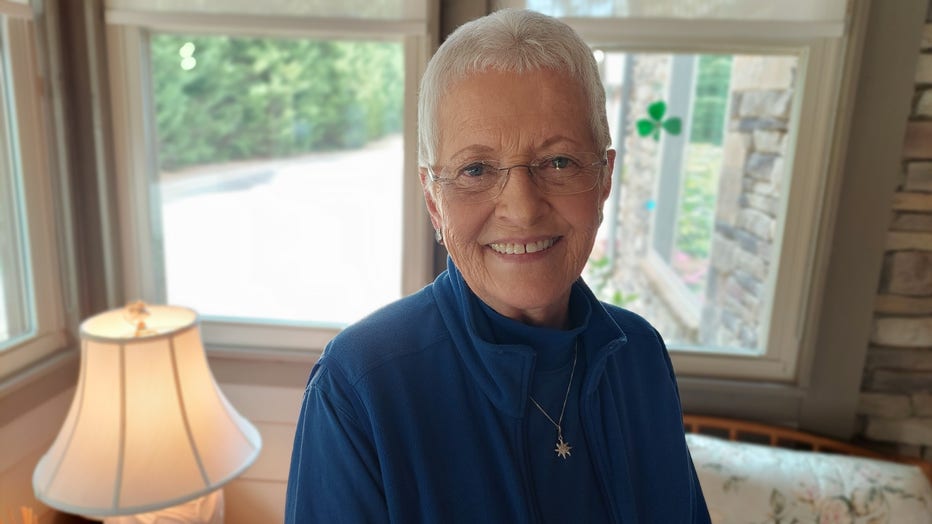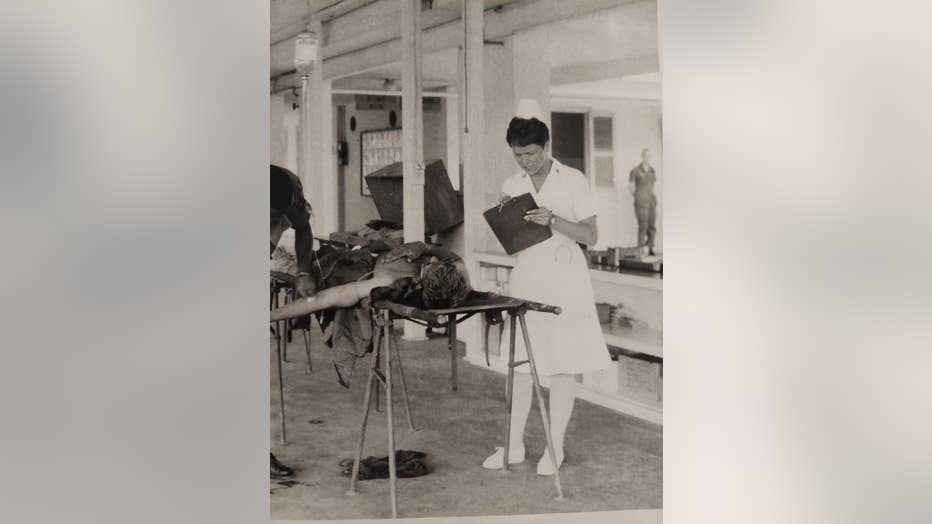'It made me stronger': Vietnam War Army triage nurse looks back on the year that shaped her life

Woman recalls service as Vietnam triage nurse
It's been 55-years since Donna Rowe touched down in Southeast Asia. The Cobb County woman would spend the next year as the head nurse in triage at one of the two busiest hospitals in Vietnam.
ATLANTA - Donna Rowe's Vietnam scrapbooks are more than a half-century old, and the Kennesaw, Georgia, nurse turned realtor is 80 now.
However, her Vietnam War experience is still a big part of Rowe's life.
"I was 23 when I went to Vietnam, and I was just about 24 when I came home," Rowe says.
Many of the nurses were fresh out of nursing school, Rowe says.

Donna Rowe, now 80, served as head nurse in the emergency triage area of the 3rd Field Hospital in Saigon from June 1968-1969. (FOX 5 Atlanta)
Vietnam War triage nurse
Recruited by the Army Nurse Corps when she was 20, Rowe who grew up in Sterling, Massachusetts, had a couple of years of experience working in emergency and trauma care before she was sent to Vietnam.
"Most of the nurses were 20, 21," she says. "They called me ‘the Old Captain.’"
One of the few Army nurses to be married at the time, Rowe and her husband Al, an Army Engineer, arrived in Saigon together in June 1968.
"It was hot, very, very hot," she remembers.
Rowe would spend the next year as the head nurse in the ER triage unit of the 3rd Field Hospital in Saigon, one of two field hospitals in the country during the war.

Donna Rowe, now 80, served as head nurse in the emergency triage area of the 3rd Field Hospital in Saigon from June 1968-1969.
They worked outside, under an awning, to the constant thunder of helicopters bringing in the wounded.
"In in one wave, two or three waves, we'd get anywhere from two to 20 to 30 to 40 at a time," Rowe remembers."My job was to keep them alive."
Wearing nursing whites, required by her nursing supervisor, Rowe was the only woman against a backdrop of men in fatigues and scrubs.
She was in charge of the team stabilizing the wounded, deciding who would be taken first into the hospital's 13 operating rooms.
"The first thing I had to check, with every casualty, was airway, hemorrhage and start an IV," she says. "Because you needed that IV on them. When they were bleeding out, they'd start to collapse on you, and you couldn't get a vein, and you had to get their name."
Bravery above Saigon
There would be too many names to remember, and too many hard days to forget.
"The worst day was the day we had a helicopter coming at us that was not a Dustoff helicopter, not an air ambulance," she says.
It was a pilot in a small reconnaissance helicopter, who was in the air over Saigon, trying to find them, with a gravely wounded soldier onboard.
"He had no medic on board, and he was trying to save this man's life," Rowe says. "So, he went in and picked up this patient in this little, tiny helicopter. I mean, the helicopter, honest to God, would fit in this room, I swear to God."
When they finally landed, the soldier was critical.
A medic warned Rowe he would likely not survive.
So, Rowe says she climbed up onto his gurney, trying to feel for his pulse.
"He had both legs gone," she says. "This arm (his right) was hanging out, and I could literally see into his chest. He was as white as a sheet, and I could not get a pulse on him."
In 365 days as head nurse, Rowe says, they had never lost a patient in triage.
She tried repeatedly but could not feel his pulse.
"I slammed my hand down on him, and I said, 'Damn it all, we lost him,'" Rowe remembers. "And he reared up on that good arm and said, 'I'm still alive.' I said, 'That's all you need to say.' We saved his life, and how we did it, I'll never know. But, we had such fantastic doctors."
Later, as the patient was being moved out to a hospital in Okinawa, Rowe saw him one more time.
"He had on his Purple Heart," she says. "And I looked at him and I said, 'I want you to go home and do good things.' And he said, 'I will.' So, that was the last I saw of him."
Women nurses in the Vietnam War
The Department of Defense says 10,000 women served on the ground in Vietnam, 90% of them nurses.
"I don't think the country really understands what the military nurses did in combat," Rowe says. "They see the injuries, obviously, they see the amputees and all that, but they don't see who saw it first. You see what I'm saying?"
She and Al returned home in June 1969.
"I was different when I came home," Rowe says. "I was still joyful and all that, but I was. I was much stronger. I became more solid in myself, and I had to. I mean, I had to really believe that I could do what I was trying to do."
They were married 47 years, before Al died from complications of ALS, tied to his exposure to Agent Orange, a toxic herbicide used in Vietnam.
Today, Donna Rowe travels, speaking to groups, and telling her Vietnam story.
"It made me stronger, and made me stronger in many ways," Rowe says. " It made me stronger in my faith, made me stronger in my love for my country, my patriotism. But, it also made me stronger as a woman."
Today, 55 years after she returned home from Vietnam, she says she is proud of herself and the men and women she served alongside.
"I became a person that I wasn't afraid to stand up for what I believed in," Rowe says. "I'm only 5,4", but I wasn't afraid to stand up for my principles and for my country. I wasn't afraid to do that. And I do that today, even."

